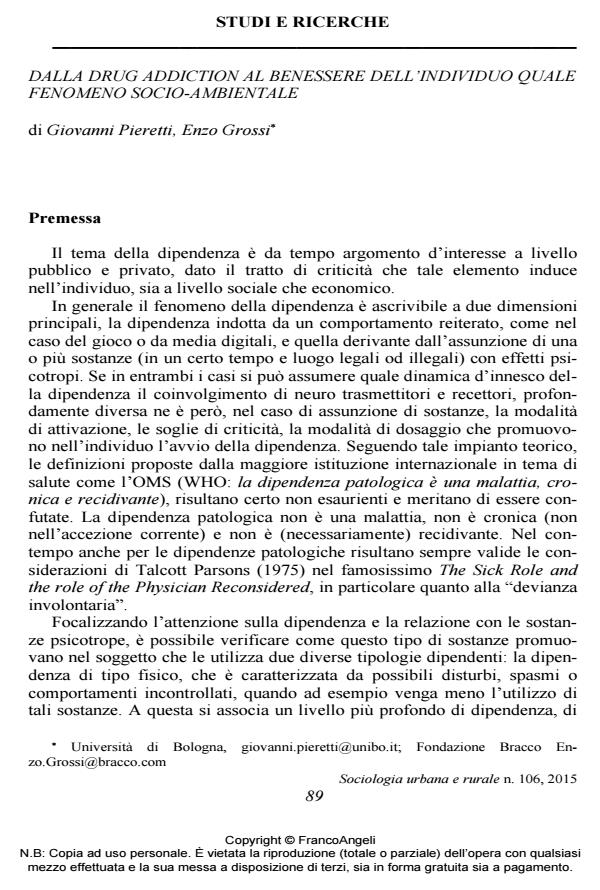From Drug Addiction to Individual Well Being as Socio-environmental Phenomenal
Journal title SOCIOLOGIA URBANA E RURALE
Author/s Giovanni Pieretti, Enzo Grossi
Publishing Year 2015 Issue 2015/106
Language Italian Pages 12 P. 89-100 File size 169 KB
DOI 10.3280/SUR2015-106007
DOI is like a bar code for intellectual property: to have more infomation
click here
Below, you can see the article first page
If you want to buy this article in PDF format, you can do it, following the instructions to buy download credits

FrancoAngeli is member of Publishers International Linking Association, Inc (PILA), a not-for-profit association which run the CrossRef service enabling links to and from online scholarly content.
The article focuses upon a new theoretical model concerning the debated topics of pathological addiction and possible prevention strategies, given the impact of addiction on the physical and psychical individual dimensions, which should affect the health status and social and economic functioning. Policies employed for the reduction and management of the pathological addiction have been based on normative parameters, such as laws, or technical, such as related to the social and welfare public system. Authors aim to depict a new possible strategy, which has to do with the relation between individual well-being and the environment, from a technical to a wider and multidisciplinary approach to strategy dealing with individual addiction and treatment.
Keywords: Individual, Addiction, Environment, Health, Well-Being, Pro-active Welfare.
- Easterlin R.A. (2000). Income and Happiness: Towards a Unified Theory. The Economic Journal, 473, 465-484. DOI: 10.1111/1468-0297.0064
- Ballas D. (2013). What makes a ‘happy city’? Cities, 32, 39-50. DOI: 10.1016/j.cities.2013.04.00
- Berlin I., Ricciardi M. (2000). Due concetti di libertà. Milano: Feltrinelli.
- Blanchflower D.G., Oswald A.J. (2002). Well-being over time in Britain and the USA. Journal of Public Economics, 7-8, 1359-1386. DOI: 10.1016/S0047-2727(02)00168-
- Bottura N., Dondi M. (2014). Tracce di emozioni: L’ascolto e la parola nella Comunità Terapeutica Educativa. Mantova: Universitas Studiorum. Cambria S. (2004). Tossicodipendenza e servizio sociale. Elementi di psichiatria delle tossicodipendenze. Milano: FrancoAngeli.
- Diener E. (1994). Assessing subjective well-being: Progress and opportunities. Social Indicators Research, 2, 103-157. DOI: 10.1007/BF0120705
- Florida R., Mellander C., Rentfrow P.J. (2013). The happiness of cities. Regional Studies, 4, 613-627. DOI: 10.1080/00343404.2011.58983
- Frey B., Schutzer L., (2000). Happiness and Economics. Princeton: Princeton University Press.
- Grossi E., Tavano Blessi G., Sacco P.L., Buscema M. (2012). The interaction between culture, health and psychological well-being: Data mining from the Italian culture and wellbeing project. Journal of Happiness Studies, 1, 129-148. DOI: 10.1007/s10902-011-9254-
- Gui B. (1996). On “relational goods”: strategic implications of investment in relationships.
- International journal of social economics, 23, 10/11, 260-278. DOI: 10.1108/0306829961014958
- Keyes C.L. (2010). Flourishing. New York: John Wiley & Sons, Inc.
- Olievenstein C. (1981). La presa in carico dell’adolescente tossicomane. Archivio di psicologia, neurologia e psichiatria, 3-4, 431-444
- Parsons T. (1975). The sick role and the role of the physician reconsidered. The Milbank Memorial Fund Quarterly. Health and Society, 257-278. DOI: 10.2307/334949
- Pieretti G., Grossi E., Ferilli G., Tavano Blessi G. (2012). Aree urbane, ambiente naturale e benessere. Il caso della città di Milano. Sociologia Urbana e Rurale, 99, 134-151. DOI: 10.3280/SUR2012-09901
- Ryan R.M., Deci E.L. (2001). On happiness and human potentials: A review of research on hedonic and eudaimonic well-being. Annual review of psychology, 1, 141-166. DOI: 10.1146/annurev.psych.52.1.14
- Santuari A. (2014). I servizi sociali e socio-sanitari nel contesto europeo. In Sesta M. (Ed.). L’erogazione della prestazione medica tra diritto alla salute, principio di autodeterminazione e gestione ottimale delle risorse sanitarie. Milano: Maggioli. Sen A. (2000). Sviluppo è liberta. Milano: Mondadori.
- Tavano Blessi G., Grossi E., Pieretti G., Sacco P.L., Ferilli G. (2014). Cultural Participation, Relational Goods and Individual Subjective Well-Being: Some Empirical Evidence. Review of Economic & Finance, 4, 33-46.
Giovanni Pieretti, Enzo Grossi, Dalla drug addiction al benessere dell’individuo quale fenomeno socio-ambientale in "SOCIOLOGIA URBANA E RURALE" 106/2015, pp 89-100, DOI: 10.3280/SUR2015-106007